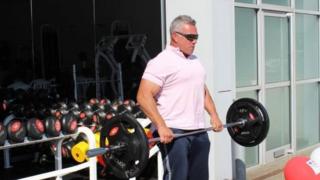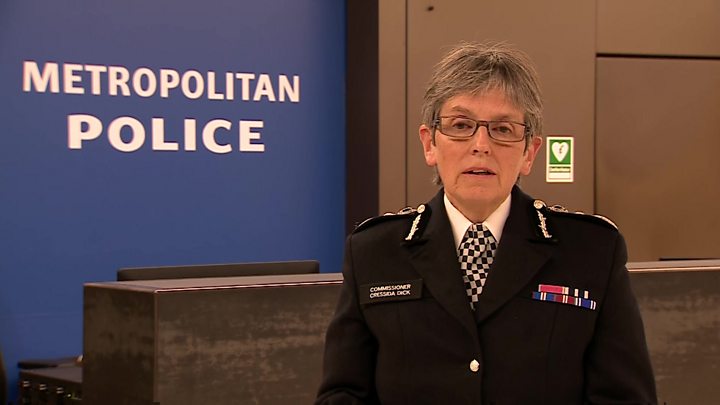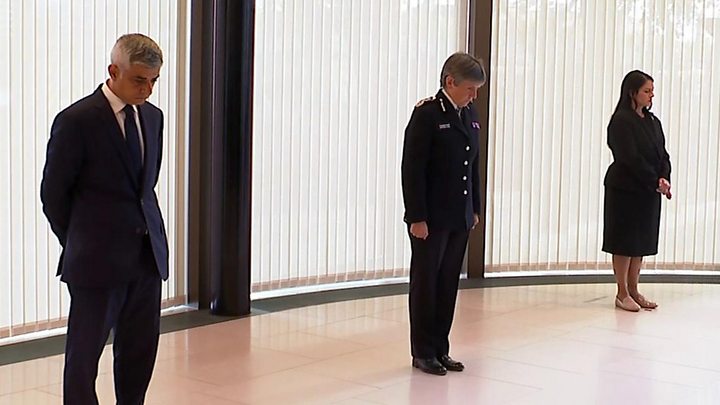 Image copyright
Neil Donohue
Image caption
Sgt Ratana was a keen rugby union coach as well as being a fan of performance motorcycles and weight-training
Image copyright
Neil Donohue
Image caption
Sgt Ratana was a keen rugby union coach as well as being a fan of performance motorcycles and weight-training
The Metropolitan Police is investigating the background of a man suspected of shooting dead a police officer in south London.
Sgt Matiu Ratana, 54, who was born in New Zealand, died in hospital on Friday after being shot as a handcuffed suspect was being checked in.
The investigation is expected to focus on the motive for the killing.
New Zealand PM Jacinda Ardern said she was "incredibly sad", telling those who knew him that "we share your sorrow."
UK leaders have also been paying tribute to Sgt Ratana, with Prime Minister Boris Johnson expressing his "deepest condolences".
Image copyright Neil Donohue Image caption Sgt Ratana moved to the UK in 1989 and joined the Met Police two years laterSgt Ratana - known as Matt - was shot in the chest at Croydon Custody Centre at about 02:15 BST on Friday.
After the shooting, the 23-year-old suspect is then thought to have shot himself.
The suspect had initially been arrested for an alleged drugs offence and possession of ammunition.
The shots were fired as officers prepared to search the suspect - who was still handcuffed - with a metal detector, according to watchdog the Independent Office for Police Conduct (IOPC). He remains in a critical condition in hospital.
Sir Peter Fahy, the former Chief Constable of Greater Manchester Police, told the BBC: "It's very callous and it's obviously going to cause a lot of fear for police officers. It's very upsetting for them as it makes them feel so vulnerable."
'Incredibly unusual'
He said the circumstances surrounding the death appeared to be "incredibly unusual", adding: "There are procedures of searching prisoners before they are taken to police station in vans or in cars, they're searched again when they get to police stations and there are additional procedures because of screening for Covid.
"It will be important to get out fairly quickly the circumstances to see if there's anything that can be learnt about it."
Image copyright Getty Images Image caption The officer has been described as a professional and inspirational colleagueThe suspect was known previously to counter-terrorism officials and had previously been referred to the government's Prevent programme, which is designed to stop people joining extremist groups and carrying out terrorist activities.
However, Met Police commissioner Dame Cressida Dick said the shooting was not being treated as terror-related.
That aspect of the suspect's background may feature prominently in police inquiries, BBC home affairs correspondent Danny Shaw said.
Separately, the IOPC is examining CCTV and police bodycam footage to establish how exactly the shootings took place.
The watchdog said the suspect was in handcuffs during the incident, with his hands behind his back.
A key part of that IOPC investigation will be to find out how thoroughly the suspect was searched before he was taken into custody.
Sgt Ratana came to the UK in his early 20s in 1989 and joined the Met Police two years later.
He was originally from the Hawke's Bay area of New Zealand and was educated at Palmerston North Boy's High School, north of the capital, Wellington.
He would have been eligible for retirement in two months and had a partner and an adult son from a previous relationship.
Speaking on Friday evening, Dame Cressida described Sgt Ratana as "talented officer".
"As a colleague, he was big in stature and big-hearted, a friendly, capable police officer," she said.

Media playback is unsupported on your device
"A lovely man, highly respected by officers and staff, and by the public, including suspects he arrested or dealt with in custody.
"He was very well known locally and will be remembered so fondly in Croydon, as well as in the Met and the rugby world."
She added: "I understand the great concern about how this happened and we will establish the facts. We owe it to Matt, his loved ones and all other officers."
Boris Johnson was also among those who reacted to the news, tweeting: "My deepest condolences go to the family, friends and colleagues of the police officer who was killed in Croydon last night.
"We owe a huge debt to those who risk their own lives to keep us safe."
Image copyright EPA Image caption Police officers and members of the public have laid flowers at Croydon police stationIn a statement, New Zealand PM Ms Ardern said: "To all Matiu's whanau [Maori for extended family] across the world, we share your sorrow and have all our condolences."
And New Zealand Police - where Sgt Ratana worked between 2003 and 2008 before returning to the UK - also sent their condolences, adding: "Policing is a family."
'Truly remarkable man'
When he was not working, Sgt Ratana was heavily involved in rugby coaching.
Ryan Morlen, assistant head coach at East Grinstead Rugby Club in West Sussex, described him as "an absolutely lovely bloke".
"He is a bloke who is just so passionate about what he does - it does not matter whether you're the most talented or least talented, he will treat you equal," he said.
Police officers and members of the public visited Croydon Police Station on Friday to lay tributes.
England Rugby also paid tribute to the 54-year-old saying he "gave so much for our sport".
The owner of a gym in Lancing, West Sussex, told the BBC how Sgt Ratana had helped when his business was going through financial difficulty.
Neil Donohue, 54, said: "He came in one day and gave me 200 quid out of the blue, I said no no, I can't accept that and gave it back to him.
"But the next day he wired it into my account. That's the sort of guy he was."

Media playback is unsupported on your device
A number of police officers have been turning their social media profile pictures black with a blue stripe to pay their respects.
John Davies, a retired officer who worked with Sgt Ratana when he was based in Hillingdon, west London, said he was "a truly remarkable, strong and unique individual" who "left an impression on all those he came into contact with".
Former police sergeant Alistair Livingstone told BBC Breakfast: "It's just utterly tragic. It almost gives all police officers, whether serving or not, the ultimate reality check that although perhaps we feel invincible when we go out and do the job everyone expects of us, in fact the risks are very real and it stops you in your tracks.
"The police are incredibly good when things go wrong like this. Some of the best support police officers get is from each other. Mental health is such a big issue across society so I hope the officers get all the support they need."

 5 years ago
1747
5 years ago
1747 

